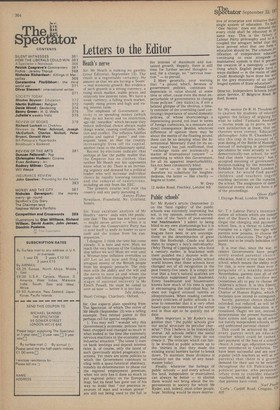Public schools'
Sir: Mr Ryder's article (September 1) on the 'fatal rigidity' of the public schools was extremely interesting but not, in my opinion, entirely accurate. As one of the 'batch of post-secondwar headmasters' I admit to being blind to my own shortcomings but it is not true that my headmaster colleagues have been or are unsympathetic to the determination of great men like Roxburgh, Coade and Kurt Hahn to respect a boy's individuality. (Why Thring of Uppingham, who lived a century earlier, is bracketed with them puzzled me.) Anyone with intimate knowledge of the public school world knows that these schools have changed out of all recognition in the past twenty-five years. It is simply not true that a boy's natural qualities are nowadays suppressed and deadened. Every headmaster and housemaster knows how much of his time is spent in encouraging the individual boy; he does not regard unusual talents as idiosyncrasies. When reading contemporary criticism of public schools it is wise to remember that it is very often based upon the memories of the writer and is thus apt to be quickly out of date.
More important is Mr Ryder's suggestion that "the public schools give our social structure its peculiar character." This I believe to be historically untrue. All schools reflect the social Structure of their time; they do not create it. The criticism which can fairly be levelled at public schools up to the 'thirties is that they made the existing social barriers harder to break down. To maintain these divisions is certainly not the wish of any headmaster today, Finally, whatever the failings of public schools — and every school in the land, independent or maintained, can always be better — to abolish them would not bring about the improvements in society for which Mr Ryder, and, indeed, most other people, hope. Nothing would be more destruc
tive of enterprise and initiative tharla, single system of education. To bell° ' One Nation ' does not demand dial every child shall be educated in tile, same way, This is the fallacy Labour Party philosophy and to it I" coupled the arrogant belief that 00 have proved what that one form, or education should be. The ultimate als' tification of independent educatico continuing to exist alongside maintained system is that it prevail° the creation of a monopoly — sonle, thing which English people have 3' ways disliked — in the realm of ideas Could Roxburgh have done his wait, in the grey monotony of an uncial, lenged system of State education?
Donald Lind Director, Independent Schools Infont ation Service, 37 Beigrave Road, SO ford, Sussex


































 Previous page
Previous page